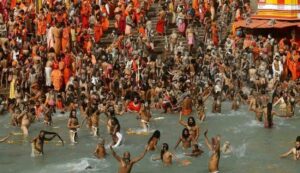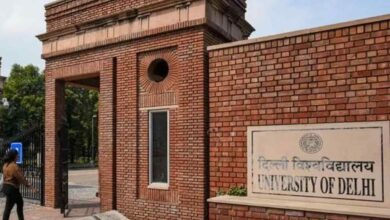Informed the National Green Tribunal about the quality of water of rivers during Maha Kumbh Mela
New Delhi: The National Green Tribunal (NGT) was recently briefed by the Central Pollution Control Board (CPCB) on the biochemical oxygen demand (BOD) of river water. According to the research, the river water quality did not fulfill the swimming standards at the majority of the places monitored between January 12 and 13, 2025.

However, because of the freshwater influx at upstream places, organic contamination (measured in terms of BOD) started to decline after this time. With the exception of the region around the Lord Curzon Bridge on the Ganga River on January 19, 2025, the river water quality satisfied the bathing requirements with regard to BOD by January 13, 2025.
Additionally, the research noted that, on many occasions, the river water quality did not fulfill the main water quality guidelines for bathing in terms of fecal coliform (FC) at all monitored sites. Fecal concentration increased as a result of the large number of people bathing in the river at Prayagraj during the Maha Kumbh Mela, particularly on auspicious bathing days.
Seven Geosynthetic Dewatering Tubes (geo-tube) filtration stations were operating at Prayagraj, according to the study. From January 6–8, 2025, a CPCB crew visited all seven locations to confirm the installation status. From January 18 to 19, 2025, they returned to confirm the treatment.
The geo-tube technology was used to treat and tap twenty-one drains. At the CPCB Regional Directorate (RD) Laboratory in Lucknow, samples were gathered and examined, and all seven geo-tubes were seen.
The findings of the sample analysis showed that none of them met the standards set out in the agenda of the National Mission for Clean Ganga’s (NMCG) 55th Executive Committee meeting.
The tribunal bench, presided over by Justice Prakash Shrivastava, said on Monday that excessive levels of total and fecal coliform were discovered at many sites after examining the records that were included with the covering letter from the UP PCB’s Central Laboratory in charge dated January 28, 2025.
The State of Uttar Pradesh’s attorney asked for a day to review the findings and provide a response. The UP PCB Member Secretary and the relevant State Authority in charge of preserving the Ganga River’s water quality in Prayagraj were instructed by the tribunal to participate virtually at the next hearing. The bench said that the case has been scheduled for February 19, 2025.
In Prayagraj, the Tribunal was looking into complaints about the water quality of the Ganga and Yamuna rivers as well as claims of untreated sewage flow into these rivers, namely in relation to the Magh Mela and Kumbh Mela.
The Tribunal ordered the CPCB and Uttar Pradesh Pollution Control Board (UPPCB) to expand their monitoring locations and frequency in order to guarantee improved monitoring and stop undesired untreated sewage from flowing into the Ganga and Yamuna rivers during the Maha Kumbh. The purpose of this step is to prevent pilgrims who go for holy baths from suffering as a result of contaminated water.
In order to prevent duplicate samples on the same day, the CPCB and UPPCB were directed to collect water samples from the Ganga and Yamuna rivers at least twice a week at regular intervals. The websites of the CPCB and UPPCB are to include the sample analysis reports. The performance of geotubes and sewage treatment plants (STPs) will also be covered in the paper.





